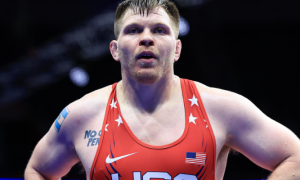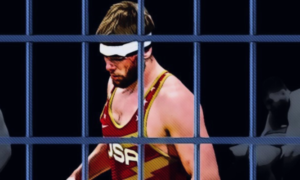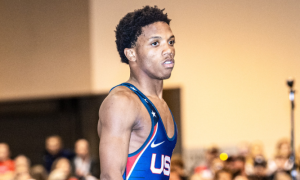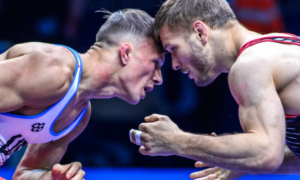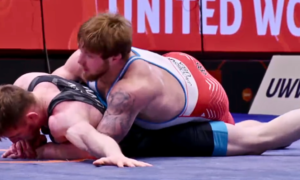Listen to “5PM16: Andrew Berreyesa and Brandon Mueller” on Spreaker.
Episode 16 of The Five Point Move Podcast puts a thorough wrap on the 2018 US Greco-Roman Nationals with a lot of the talk centering around the excitement of the event along with its perceived implications. In addition, co-host Dennis Hall answers a few questions pertaining to how he used to approach competing at the US Open throughout his career and what he remembers most about the first time he emerged victorious in Las Vegas.
The two guests are great ones — Andrew Berreyesa (82 kg, NYAC/FLWC) and Air Force’s Brandon “Moonrock” Mueller (77 kg). For Berreyesa, his time in Las Vegas was extremely memorable. Though he wasn’t exactly an underdog, the 2017 Fargo National champ had to do battle in a stacked weight class on the Junior side, scoring three grueling wins over top-flight competitors including fellow stout prospect Tommy Brackett (NMU/OTS) in the finals, providing Berreyesa with his first UWW National tournament triumph as well as a bye to the Junior World Team Trials best-of-three series in June. A devoted student of the sport, the Nevada native also provides insights as to how he manages being a collegiate wrestler at Cornell while still holding lofty Greco-Roman aspirations.
Mueller, who actually trained under Hall on occasion back when he was a youth, is a true Greco anomaly. Despite hailing from Wisconsin, Mueller didn’t pick up the style until he was already in his mid-20’s. He’s been able to make an impression all the same. Last year, Mueller followed up a strong performance at the Armed Forces Championships with a silver medal at the Kristijan Palusalu tournament in Estonia. A 2-2 performance at the US Senior Trials next gave way to an 0-2 ledger at the CISM Military World Championships last September. But his two losses at that event were to former Senior World medalists Adam Kurak (RUS) and Afshin Byabangard (IRI) by a combined six points. Last week in Vegas, Mueller entered in the deep 77-kilogram field and came away with a strong seventh-place showing as he still works to find himself in a full-time training environment.
For those who may be unaware, Mueller is also a physicist in the Air Force, and as you might imagine, extraordinarily intelligent. Therefore, it seemed like a solid idea to go off the rails with him during the second part of the interview where he answered questions about conspiracy theories regarding the moon landing(s), the efficiency of solar panels, and global warming. Yes, it is a different sort of episode, but nevertheless, a really fun listen.
A few highlights
Hall on feeling pressure to perform at the Open later in his career
“In the 2000’s, I carried some pressure. It was my job, my full-time job, and it was to win. I was trying to provide insurance for my family. I was trying to provide them (with) an okay living, not poverty. So, there was pressure. From 2000 up until 2002, I had one kid. And then in 2002, I had another kid, and you’re living a life of poverty if you don’t win it, you know? There definitely was pressure based upon my circumstances with my family. So it did change. When I was younger, ’92 through ’96, there wasn’t much pressure, it was more fun. But once you have a kid, life changes.”
Berreyesa on his performance in the finals of the UWW Junior Nationals
“I realized going against (Tommy) Brackett, he’s really tough in the hand-fight and I knew that was where I was going to have to beat him. Not give up an underhook because that’s where he gets all of his wins from, mostly. It was going to have to be a hard hand-fight.”
Berreyesa on having three tough opponents in a row to win the tournament
“I was a little doubtful, I guess, after my first match with (Zach) Brunagel because I beat him easily at Fargo and he was prepared this time. He made some adjustments so I am going to have to be ready for him, too. I didn’t have any easy go’s at it, I had to fight in all three of my matches. It was tough, but I was pretty glad to get the job done, I guess.”
Mueller on learning how good his opponents are
“It’s a lot of fun. I don’t even know how to judge a close loss because at (the 2017 Trials), every match I won and lost by tech fall. Because there, I was just going crazy at the end of matches since I had nothing else to go for, so I’m getting tossed at the end of matches. So I don’t really know the right way to look at it. (Afshin) Byabangard, I had no idea who he was going into that match. I knew he was going to be tough. I watched him in one of his previous matches and he looked tough against (Adam) Kurak, and I mean, Kurak was good. So that was kind of my gauge.”
Mueller on the concept of climate change
“The really good satellite data started in the 80’s and there is good evidence the temperature has risen some marginal amount. Now, you can debate how much of it is related to what the humans are doing or how much isn’t, and I think the real debate is what can we do about it. Because, the benefits we’ve received from fossil fuels going back to the Industrial Revolution, even going back to the last hurricane, Harvey, that was bad. But even if you said global warming caused that hurricane or caused it to be worse than it would have been, well, the fact we have fossil fuels allowed us to build a satellite and go into space to image it, predict it, evacuate the people, and everything else.”
SUBSCRIBE TO THE FIVE POINT MOVE PODCAST
iTunes | Stitcher | Spreaker | Google Play Music | RSS



